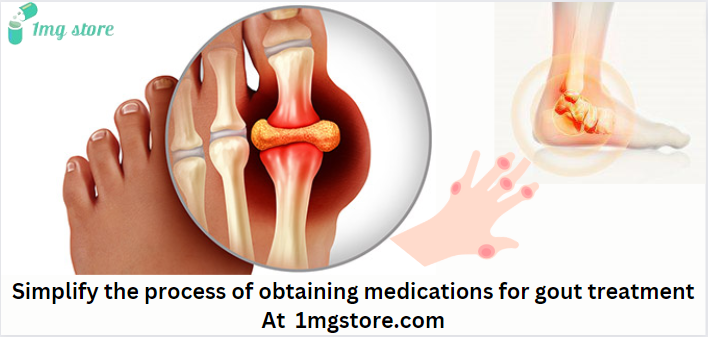
Gout
- Generic: AllopurinolEquivalent Brand: Lopurin30 Tablet/s$8.90
- Generic: FebuxostatEquivalent Brand: Uloric30 Tablet/s$13.00Out of stock
Gout Management: Unveiling the Significance of Gout Medicines in Joint Health
Introduction:
Gout, a form of arthritis characterized by intense joint pain and inflammation, has been recognized since ancient times as the "disease of kings" due to its association with rich diets. Today, gout affects individuals across all walks of life, impacting joint health and overall well-being. The category of Gout Medicines emerges as a crucial component in managing and preventing gout attacks, offering relief from pain, reducing inflammation, and addressing the underlying factors contributing to this inflammatory arthritis. This comprehensive guide explores the importance of Gout Medicines, delving into the complexities of gout, its causes, symptoms, and the pivotal role these medications play in enhancing joint health and restoring a life free from the shackles of gout.
Understanding Gout:
Gout is caused by the accumulation of urate crystals in the joints, leading to sudden and severe bouts of pain, inflammation, and redness. These crystals form when there is an excess of uric acid in the blood, a condition known as hyperuricemia. The joint most commonly affected by gout is the big toe, but it can also impact other joints such as the ankles, knees, wrists, and fingers.
The Importance of Gout Medicines:
1.Alleviating Acute Gout Attacks:
Gout Medicines, particularly nonsteroidal anti-inflammatory drugs (NSAIDs) and colchicine, are crucial in alleviating the intense pain and inflammation associated with acute gout attacks. Prompt intervention with these medications can significantly reduce the duration and severity of gout flares.
2.Reducing Uric Acid Levels:
Chronic gout management involves addressing the underlying cause—elevated uric acid levels. Medications such as allopurinol and febuxostat work by inhibiting the production of uric acid or enhancing its excretion, thereby reducing the risk of recurrent gout attacks.
3.Preventing Joint Damage:
Recurrent gout attacks can lead to joint damage and deformities. Gout Medicines that effectively lower uric acid levels play a pivotal role in preventing long-term joint damage, preserving joint function, and improving overall joint health.
4.Promoting Lifestyle Modifications:
Gout management extends beyond medications to lifestyle modifications. Gout Medicines often work in tandem with dietary changes and lifestyle adjustments to optimize uric acid control. This holistic approach is crucial in preventing gout flares and promoting overall health.
5.Managing Coexisting Conditions:
Gout often coexists with other health conditions such as hypertension, diabetes, and kidney disease. Gout Medicines are selected with consideration for these coexisting conditions, ensuring comprehensive management and minimizing potential interactions.
6.Enhancing Quality of Life:
The excruciating pain associated with gout attacks can significantly impact an individual's quality of life. Gout Medicines that provide relief from pain and reduce the frequency of attacks contribute to an improved overall quality of life for individuals living with gout.
7.Preventing Tophi Formation:
Tophi are nodular deposits of urate crystals that can form under the skin and in joints, leading to deformities and chronic inflammation. Gout Medicines, particularly those that target uric acid levels, play a crucial role in preventing tophi formation and reducing the associated complications.
8.Minimizing Systemic Inflammation:
Gout is not only confined to joints but can also contribute to systemic inflammation. Gout Medicines that effectively control uric acid levels contribute to reducing overall inflammation, benefiting not only joint health but also the cardiovascular and renal systems.
9.Educating and Empowering Patients:
Gout Medicines empower individuals to take an active role in managing their condition. Patient education on medication adherence, lifestyle modifications, and recognizing triggers for gout attacks is integral to effective gout management.
10.Holistic Approach to Gout Care:
Gout Medicines form part of a holistic approach to gout care that involves collaboration between healthcare providers and patients. This approach encompasses medication management, lifestyle changes, and ongoing monitoring to optimize gout control and improve long-term outcomes.
Conclusion:
In conclusion, the importance of Gout Medicines in the landscape of healthcare is paramount. As individuals navigate the challenges posed by gout, these medications emerge as essential tools for managing acute attacks, preventing joint damage, and addressing the underlying cause of elevated uric acid levels. By providing relief from pain, minimizing systemic inflammation, and promoting lifestyle modifications, Gout Medicines play a pivotal role in restoring joint health and enabling individuals to lead fulfilling lives free from the burden of gout.


